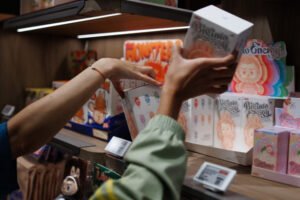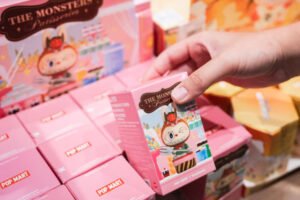China’s newest cultural export isn’t a smartphone or a new EV—it’s an “ugly-cute” toy elf with bunny ears. Labubu, the fuzzy figurine from Beijing-based toy titan Pop Mart, has captured the global imagination and exploded in popularity across markets from Asia to Europe. While demand for the toys has intensified, so has a simultaneous shadow economy-drove by unlicensed replicas and gig workers crafting the replicas in private homes.
Labubu’s success story is not just about a viral trend. It’s a case study in modern Chinese soft power, IP enforcement, and the country’s evolving industrial narrative—from “Made in China” to “Created in China.”

Pop Mart’s Global Breakthrough
Founded in 2010, Pop Mart built its brand on the blind-box retail model—where consumers purchase sealed boxes without knowing which collectible is inside. Labubu, a mischievous elf designed by artist Kasing Lung, became the brand’s breakout hit, thanks in part to endorsements from celebrities like Rihanna and Lisa of K-pop group Blackpink.
In markets like the UK, Pop Mart has had to temporarily pull the dolls from stores to prevent crowd-related incidents. At £17.50 per unit, with resale prices climbing significantly higher, Labubu has become not only a cultural symbol but also a prized collectible.
The Lafufu Underground
With demand skyrocketing, the counterfeiting market has responded in kind. In cities like Shenzhen, unlicensed versions of Labubu—dubbed “Lafufus”—are openly traded in back alleys, disguised shops, and hidden marketplaces. While authorities ramp up enforcement, the counterfeit ecosystem has simply gone deeper underground.
Local authorities in Shenzhen’s electronics hub Huaqiangbei have recently pledged inspections of shops suspected of selling counterfeits. Even so, informal distribution channels continue to thrive. Through quiet phone calls to behind-the-counter purchases at anonymous malls, dealers offer credible copies for less than 50% of the real thing.

An Invisible Workforce
What we rarely see in counterfeiting of fashion, food or even electronics is thousands of unregistered gig workers. The gig economy includes unintentional gig workers like Li Yang. Often unregistered gig workers are primarily elderly women who provide goods to their neighbourhood buyers. In cramped apartments across Shenzhen’s high-rise suburbs, they slice silicon heads of elf dolls by hand—a labor-intensive process that earns them as little as 0.04 yuan per piece.
“We’re just looking for ways to stay busy while caring for the grandchildren,” says Li, seated among bags of flesh-colored plastic pieces. Few of the workers even know what Labubu is—until a visiting grandchild recognizes the doll and squeals in delight.
A Soft Power Success—and Its Risks
The Chinese government has taken Labubu as a symbol of national creativity. In June, the People’s Daily, which is the official newspaper of the Chinese Communist Party, heralded Pop Mart’s success as a milestone in its pursuit of innovation-led growth. Labubu, it proclaimed, is where China’s manufacturing potential meets consumer appeal on a global scale.
But with recognition comes a warning: knock-off goods risk threatening not only Pop Mart, but China’s reputation abroad. In recent months, customs officials have reportedly seized hundreds of thousands of counterfeit Labubu products, as enforcement of intellectual property rights increases.
“Defending Labubu’s IP is no longer just a corporate issue—it’s a matter of national interest,” notes Yaling Jiang, a consumer trends analyst.
Business Implications
For Indian businessmen and women, as well as policy makers observing the dynamic of the Chinese IP system, the Labubu phenomenon is instructive. It demonstrates the economic promise of local creativity, the dangers of weak enforcement, and the economic and social ramifications of informal labor networks.
As India strives to become an aspirational soft power brand with toys, gaming, and design, the Labubu story—both its emergence and underground reproduction—is a reminder that creative success often invites unanticipated outcomes.
